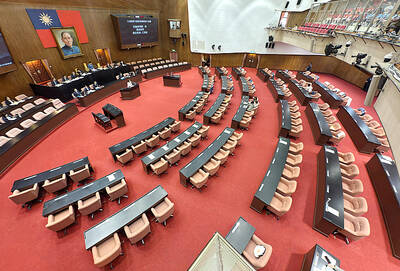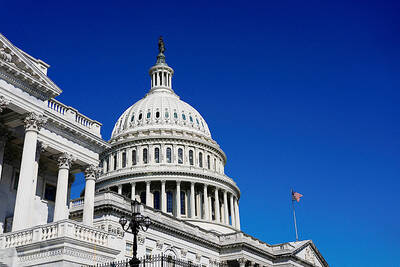The recent surge in oil prices is actually a boon for aircraft manufacturers, encouraging airlines to acquire planes that are more efficient than an earlier generation of fuel guzzlers now sitting idle in US deserts.
The cost of aviation fuel, US$0.30 per liter on June 30, rose 21.8 percent over the previous six months and 33 percent on the year, according to one study by France's Union of Petroleum Industries.
"That could move companies to order newer aircraft that use less fuel rather than trying to bring back the numerous planes that have been parked in the desert in the United States," said Jean-Paul Bechat, chairman of French engine and equipment maker Snecma.
The civil aviation industry went into a tailspin in 2001, brought on by a global economic downturn, armed conflict, terrorism threats and epidemics. The International Civil Aviation Organization has estimated that the sector lost US$6.6 billion last year.
But a recovery that was first detected at the end of last year, which saw a 19.4 percent increase in traffic from January to May of this year, according to the International Air Transport Association, has prompted carriers to reactivate some of the planes parked in the desert and to acquire newer models that consume substantially less fuel than their predecessors.
The latest version in Boeing's 737 line, the 737-900, burns 25 percent less fuel than earlier versions, the 737-200 or 300, the US manufacturer said.
Companies have shipped 141 aircraft of the 737-200 and 300 models to the desert to wait out the crisis.
Boeing also says its future 7E7 model should consume 20 percent less fuel that the A330 of its European rival Airbus.
But Airbus maintains that its giant A380, which will have a passenger capacity of 550 and will be the world's largest airliner, will be 15 percent more fuel efficient per seat than Boeing's 747-400.
In the rivalry between Boeing and Airbus, the Farnborough Air Show, which opens today near London, could give the US firm a chance to reassert itself.
For the first time in its history, Airbus, a subsidiary of the European Aeronautic Defense and Space company, last year delivered more aircraft than its US competitor Boeing, giving it a 52 percent share of the market.
Airbus delivered 305 planes to Boeing's 281. Airbus also eclipsed Boeing in the first three months of this year, delivering 161 aircraft to Boeing's 151.
But the US manufacturer vowed a fierce fight-back and foresees a pickup in the civil aviation sector starting in 2006.
Boeing is in particular banking on the fuel-efficient 7E7, for which it already has 50 firm orders from All Nippon Airways and two from Air New Zealand.
The company hopes to secure 500 to 600 orders between now and the first test flights in 2007.
The British charter carrier First Choice and the Italian airline Blue Panorama have just announced plans to order 10 7E7s.
And in Asia, the 7E7 is said to interest Singapore Airlines, and a Chinese company could likewise come forward.
Airbus meanwhile is pinning its hopes on its A380, for which it has received 129 firm orders, with initial deliveries scheduled for 2006.
Airbus is in addition angling for an A380 contract from China ahead of the 2008 Olympic Games.
The deal could be announced during a visit to China in the autumn by French President Jacques Chirac.

The Chien Feng IV (勁蜂, Mighty Hornet) loitering munition is on track to enter flight tests next month in connection with potential adoption by Taiwanese and US armed forces, a government source said yesterday. The kamikaze drone, which boasts a range of 1,000km, debuted at the Taipei Aerospace and Defense Technology Exhibition in September, the official said on condition of anonymity. The Chungshan Institute of Science and Technology and US-based Kratos Defense jointly developed the platform by leveraging the engine and airframe of the latter’s MQM-178 Firejet target drone, they said. The uncrewed aerial vehicle is designed to utilize an artificial intelligence computer

The Chinese Nationalist Party (KMT) caucus yesterday decided to shelve proposed legislation that would give elected officials full control over their stipends, saying it would wait for a consensus to be reached before acting. KMT Legislator Chen Yu-jen (陳玉珍) last week proposed amendments to the Organic Act of the Legislative Yuan (立法院組織法) and the Regulations on Allowances for Elected Representatives and Subsidies for Village Chiefs (地方民意代表費用支給及村里長事務補助費補助條例), which would give legislators and councilors the freedom to use their allowances without providing invoices for reimbursement. The proposal immediately drew criticism, amid reports that several legislators face possible charges of embezzling fees intended to pay

REQUIREMENTS: The US defense secretary must submit a Taiwan security assistance road map and an appraisal of Washington’s ability to respond to Indo-Pacific conflict The US Congress has released a new draft of the National Defense Authorization Act (NDAA), which includes up to US$1 billion in funding for Taiwan-related security cooperation next year. The version published on Sunday by US House of Representatives Speaker Mike Johnson removed earlier language that would have invited Taiwan to participate in the US-led Rim of the Pacific Exercise (RIMPAC). A statement on Johnson’s Web page said the NDAA “enhances U.S. defense initiatives in the Indo-Pacific to bolster Taiwan’s defense and support Indo-Pacific allies.” The bill would require the US secretary of defense to “enable fielding of uncrewed and anti-uncrewed systems capabilities”

Renewed border fighting between Thailand and Cambodia showed no signs of abating yesterday, leaving hundreds of thousands of displaced people in both countries living in strained conditions as more flooded into temporary shelters. Reporters on the Thai side of the border heard sounds of outgoing, indirect fire yesterday. About 400,000 people have been evacuated from affected areas in Thailand and about 700 schools closed while fighting was ongoing in four border provinces, said Thai Rear Admiral Surasant Kongsiri, a spokesman for the military. Cambodia evacuated more than 127,000 villagers and closed hundreds of schools, the Thai Ministry of Defense said. Thailand’s military announced that